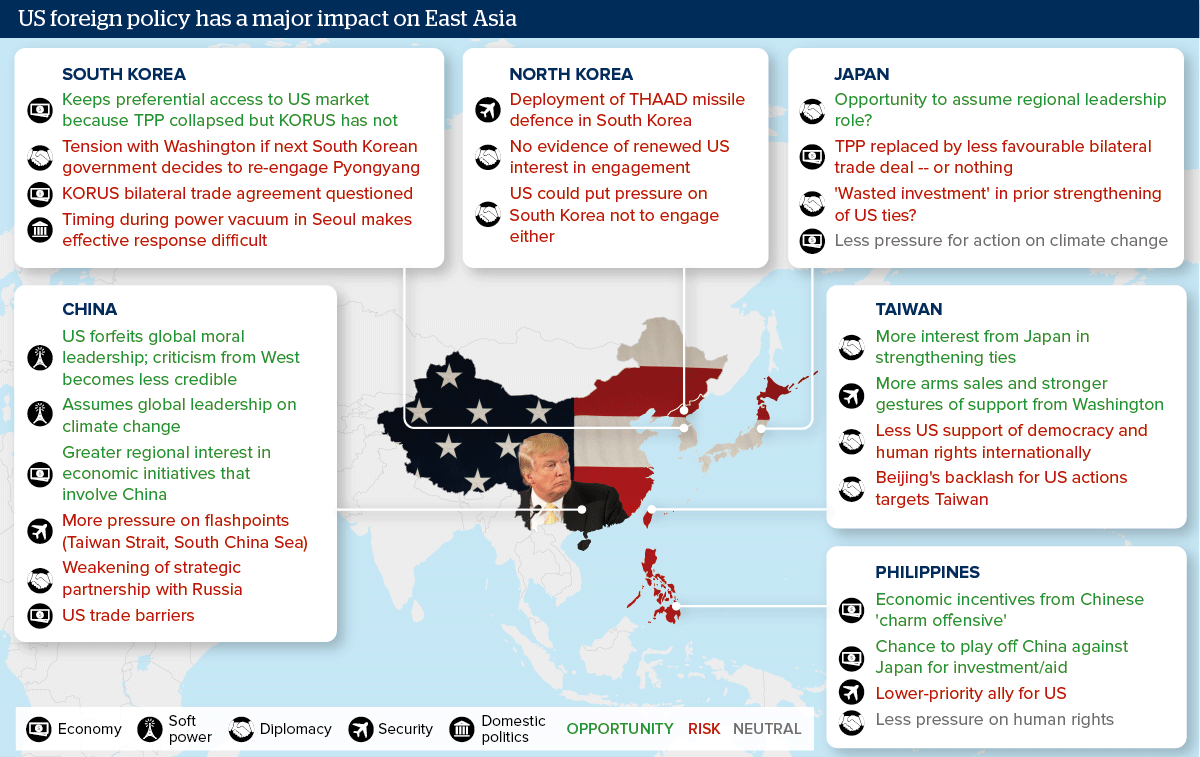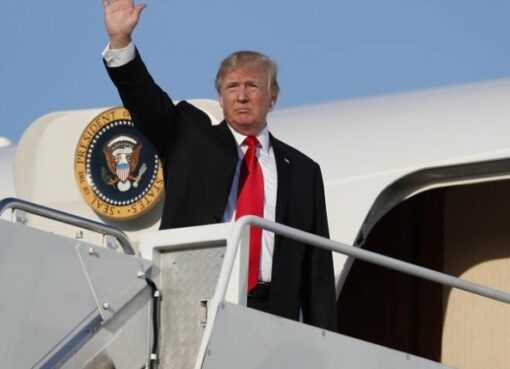by Prasad Nallapati
The US President Donald Trump’s foreign policy is a process still in the making, which is little bumpy in the beginning. It is interesting to watch how election rhetoric gradually gives way to a more pragmatic policy. He sent emissaries to Mexico to calm it down and Defence Secretary Gen. James Mattis to reassure American commitment to the NATO, while making a good start with Japan and China.
It is a two-way traffic as foreign governments do make their own adjustments and contribution to the evolving policy in different ways. It would be relevant to study how Japan and China are approaching to shape up Trump’s East Asia policy which could offer some lessons for India.
Rhetoric and New Policy
Trump told Fox TV, in an interview prior to his inauguration, “I don’t know why we have to be bound by a ‘one China’ policy unless we make a deal with China having to do with other things.” He reached out to Taiwanese President Tsai Ing-wen upsetting Beijing. He accused China of unfair trade and fiscal policies and pledged to slap a 45 per cent import tariff as it is a currency manipulator.
However, President Trump rather had a pleasant conversation with President Xi Jinping during their first official telephonic call where he re-affirmed the `one China’ policy.
Similarly, “candidate” Trump had criticized Japan for “free-riding” and not paying its fair share for the American forces defending it. But, President Trump had all the praise for Tokyo during his extended official meeting with Prime Minister Shinzo Abe. He promised that the United States was “committed 100 per cent to the security of Japan and all areas under its administrative control.”
There is nothing unusual about such transformation from election rhetoric to serious policy formulation as past Presidents had also run their campaigns severely criticizing the policies of these countries, but changed tone once in power.
However, there is something peculiar about Trump’s policy re-orientation if one carefully looks at the developments since his election in November last.
US – China Contacts
Donald Trump and his son-in-law, Jared Kushner, have extensive business dealings with China both at the governmental level and with private corporations. It is reported that just after Trump’s November electoral triumph, Chinese officials decided a decade-long trademark wrangle in his favour, creating a sense of special treatment.
Trump business group is working on 20-30 hotel deals in China, according to its CEO, and AFP previously reported its negotiations with the country’s largest state-owned enterprise, State Grid Corporation.
According to New York Times, a property in Manhattan owned by Trump has a loan of $950 million that was paid for by different entities, including the Bank of China and Goldman Sachs.
Kushner’s business interests are linked, among others, to Chinese insurance giant, Anbang. He was reportedly seen, much after the election of Trump, in closed door meetings with Wu Xiaohui, chairman of Anbang Insurance Group, and China’s Ambassador to the US, Cui Tiankai. Wu and Kushner were reportedly discussing a joint venture to re-develop a prime property in Manhattan, New York.
Kushner’s wife, Ivanka, who is daughter of Trump, made a surprise appearance at the Chinese New Year reception in January hosted by Ambassador Cui Tiankai. Ivanka posted a video of her daughter on Instagram playing with a traditional Chinese marionette and singing a song in Mandarin.
Kushner is believed to be instrumental in persuading Trump to pick up some Sinophiles, who have close business relations with him, into inner cabinet circles. These include Gary Cohn, former President of Goldman Sachs, as chief economic adviser; Wilbur Ross as Commerce Secretary; and Philip Bilden nominated as Secretary of the Navy, though he has withdrawn later.
Former US Secretary of state Henry Kissinger, who continues to play a role of `respected adviser’ in Beijing, appeared to be involved in his own “shuttle” diplomacy. He met with President Xi Jinping on December 2. He earlier had talks with Trump two weeks before the visit to Beijing and also after return from there.
Besides Kushner and Ivanka, Ambassador Cui Tiankai invested enormous efforts to cultivate a broad relationship with National Security Adviser, Michael Flynn, who had to resign following allegations of “improper” contacts with Russian Ambassador Sergey Kislyak.
Japan’s overtures
Prime Minister Abe, rattled by Trump demands, had decided to make an early dash to New York to have the first-hand feel of the President-elect’s mind and build a better rapport.
Abe met Trump for informal talks in New York on November 18, within 10 days after the election, which was also attended by Kushner and Ivanka. While there were no reports of what had been discussed, Trump described it as beginning of a great friendship and Abe mentioned of establishing a relationship of trust.
It was followed up by formal talks in Washington DC on February 10 with an added `golf round’ in Florida for the weekend. On the eve of the talks, Japanese officials hinted at offering a five-pronged plan, the “U.S.-Japan Growth and Employment Initiative,” that would ostensibly create up to 700,000 jobs through greater Japanese investment in the United States. Abe offered a similar investment package to President Putin of Russia in the hope of a favourable decision on Kurile islands.
The two leaders agreed to set up a formal “bilateral dialogue framework” on trade and related economic and security issues to be co-chaired by US Vice President Mike Pence and Japanese Deputy Prime Minister and Finance Minister Taro Aso. Abe reconciled to American withdrawal from the TPP and the new framework provides for looking at prospects of negotiating a bilateral trade pact. Japan is also to increase its defence contribution.
Like China, Japan had also invested its efforts in building up its relations with Michael Flynn, whose resignation is a big loss to them. He attended both the meetings Abe had with Trump. Even before the presidential election, Flynn visited Japan in October and had unofficial talks with Chief Cabinet Secretary Yoshihide Suga. Similarly, in December 2016, Shotaro Yachi, National Security Adviser, made a visit to Washington DC for talks with Flynn.
Both China and Japan addressed the underlying American commercial and economic interests, which ensured protecting their “core” interests. There is, however, a contrast in the way the two governments approached in impressing the new administration. While China used its quiet diplomacy, using several of its instruments of influence, Japan is visibly shaken to rush its Prime Minister into the ring.
Abe was criticized at home for being excessively submissive. In contrast, Xi gained further domestic prestige by presenting himself as one refusing to take a call from President Trump unless the latter re-affirms “one-China’ policy. As some commentators put it, Tokyo does not have an alternative to its alliance with the United States to deter the threat of nuclear North Korea and an increasingly aggressive China.
Lessons for India
As the above conduct of China and Japan shows, it is imperative for New Delhi to be very pro-active in offering to the new President something that would be of interest to him. Trump’s electoral promises of close relationship with India cannot be taken at its face value unless New Delhi demonstrates its willingness to make a value addition to the ties. Following is a small list of issues, not necessarily exhaustive ones, which may help in binding the Trump administration in a firm relationship with India.
- Indian corporations may be encouraged to acquire some of American strategic hi-tech companies, which may contribute to technology transfers and innovations in India. Such investments not only create jobs for Americans but provide much needed technology and financial returns for India.
- Corporations of the two countries may work to jointly bid and operate projects in third countries. Some of the successful examples include Sakhalin-1 project in Russia, where Indian ONGC Videsh Ltd and American ExxonMobil jointly operate with other companies. Such joint ventures in Russia, Central Asia and elsewhere would offer mutual benefits.
- India may show greater willingness to negotiate some of the trade disputes with the US, in the spirit of quid pro quo. Imaginative solutions to be worked out while agreeing to some American demands in return for greater market access and technology transfers.
- Immigration reforms is a core issue for Trump administration and India will be better served if it avoids making H1B/L1 visa matters a major agenda point of its bilateral discussions.
- On the foreign policy issues, India may work to bring policies of the US and Russia little closer to get the two coordinate their actions to resolve international issues. President Trump is very keen for a positive relationship with Russia although the security agencies continue to have an adversarial attitude toward President Putin. India can play a meaningful role in reaching out to the two countries for such a purpose in a more transparent way. This will also help address the concerns the two countries have on India’s relations with each of them.




